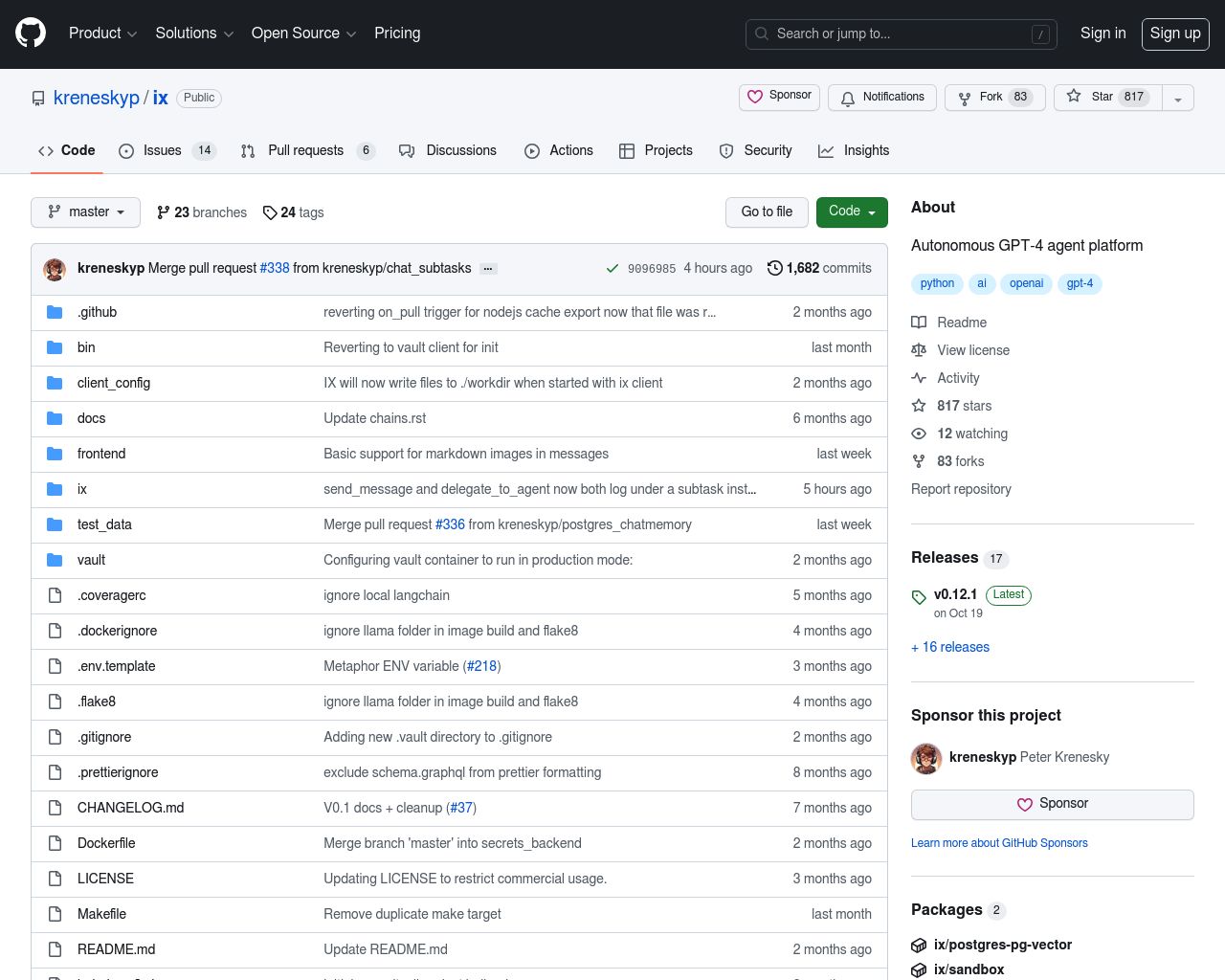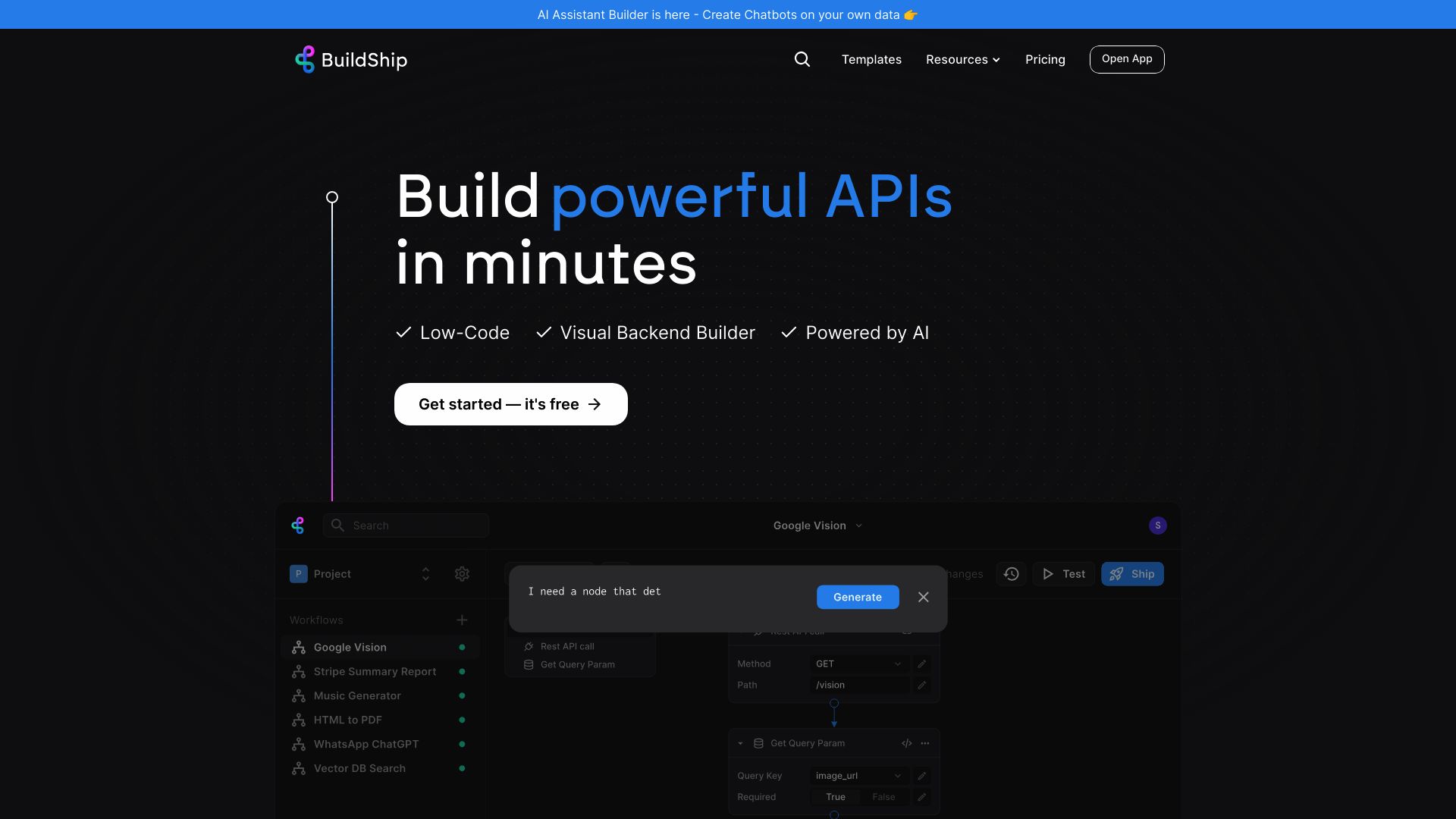Agent iX vs. BuildShip: AI Development Platforms Compared
AI development platforms revolutionize how businesses create intelligent solutions. Agent iX vs. BuildShip offer unique approaches to this challenge, each with distinct strengths and limitations. Agent iX focuses on autonomous AI agents, while BuildShip specializes in backend workflow automation.
This comparison explores their key features, capabilities, and use cases to help you choose the right tool for your AI development needs. We’ll also introduce SmythOS, a comprehensive platform that combines the best of both worlds and offers additional advanced features for seamless AI integration across your business processes.
Agent iX Overview
Agent iX empowers developers to create, host, and manage AI agents through an open-source platform. The system excels in running multiple agents concurrently, fostering collaboration and knowledge sharing among autonomous entities.


Agent iX stands out with its no-code editor, providing an intuitive graphical interface for designing AI agents. Users can construct cognitive logic through drag-and-drop interactions, making agent creation accessible to those with minimal coding experience. This visual builder streamlines the development process, enabling rapid prototyping and iteration.
Agent iX stands out with its no-code editor, providing an intuitive graphical interface for designing AI agents. Users can construct cognitive logic through drag-and-drop interactions…
The platform offers robust capabilities including web research, task automation, code generation, and API integration. Its smart input feature enhances user experience by auto-completing agent mentions and task-related artifacts. Agent iX’s dockerized setup ensures scalability and efficient resource management, accommodating growing demands.
While Agent iX provides powerful tools for AI agent development, it lacks some advanced features. The platform does not explicitly support multimodal inputs, audit logs for analytics, or data encryption. Additionally, there’s no mention of Huggingface AI integration or support for PDF and Word file formats. These limitations may impact users requiring more comprehensive data handling and security features.
BuildShip Overview
BuildShip empowers users to create backend workflows and APIs without extensive coding. Its visual no-code platform streamlines the development process, allowing teams to build, test, and deploy complex automations rapidly.
The BuildShip workflow builder excels in simplifying backend development. Its drag-and-drop interface enables users to construct workflows by connecting pre-built nodes or generating custom ones through AI assistance. This approach democratizes backend development, making it accessible to both seasoned developers and non-technical professionals.
BuildShip empowers users to create backend workflows and APIs without extensive coding. Its visual no-code platform streamlines the development process, allowing teams to build, test, and deploy complex automations rapidly.


BuildShip’s platform integrates various data sources, APIs, and AI models, allowing users to create sophisticated workflows. The system supports custom logic in JavaScript/TypeScript for advanced customization. Robust testing features enable iterative development, while the ability to deploy workflows as production-grade APIs facilitates seamless integration into existing applications.
Key features include AI-powered node creation, secure API key storage, and scheduled workflow execution. While BuildShip offers significant advantages in backend automation, it may have limitations in areas like multimodal support or advanced AI agent collaboration. The platform’s focus on backend workflows and APIs may not fully address needs for complex, autonomous AI agents or extensive human-AI interactions.
Feature Comparison
Agent iX and BuildShip offer distinct approaches to AI development and workflow automation. Agent iX excels in creating and managing autonomous AI agents, while BuildShip focuses on backend workflow automation and API creation.
Agent iX provides a robust platform for developing AI agents capable of complex tasks like web research, code generation, and multi-agent collaboration. Its no-code editor enables users to construct agent logic visually, making AI development accessible to a broader audience. However, Agent iX lacks some advanced features like multimodal support, audit logs for analytics, and data encryption.
BuildShip, on the other hand, specializes in backend workflow automation without extensive coding. Its visual builder simplifies the creation of APIs and complex backend processes. BuildShip integrates various data sources and AI models, allowing for sophisticated workflow design. While powerful for backend automation, BuildShip may not fully address needs for autonomous AI agents or extensive human-AI interactions that Agent iX offers.
| Agent iX | BuildShip | SmythOS | |
|---|---|---|---|
| CORE FEATURES | |||
| Hosted Agents (Dev, Production) | ❌ | ✅ | ✅ |
| Environments (Dev, Production) | ❌ | ✅ | ✅ |
| Memory & Context | ❌ | ❌ | ✅ |
| Autonomous Agents | ❌ | ❌ | ✅ |
| Explainability & Transparency | ❌ | ❌ | ✅ |
| Debug Tools | ❌ | ✅ | ✅ |
| Multimodal | ❌ | ❌ | ✅ |
| Problem-Solving Capabilities | ✅ | ❌ | ✅ |
| Multi-Agent Collaboration | ✅ | ❌ | ✅ |
| Human-AI Interaction | ✅ | ❌ | ✅ |
| Audit Logs for Analytics | ❌ | ❌ | ✅ |
| Work as Team | ❌ | ❌ | ✅ |
| SECURITY | |||
| Constrained Alignment | ✅ | ❌ | ✅ |
| Data Encryption | ❌ | ✅ | ✅ |
| OAuth | ❌ | ✅ | ✅ |
| IP Control | ❌ | ✅ | ✅ |
| COMPONENTS | |||
| Foundation AIs | ✅ | ❌ | ✅ |
| Huggingface AIs | ❌ | ❌ | ✅ |
| Zapier APIs | ❌ | ❌ | ✅ |
| Classifiers | ❌ | ❌ | ✅ |
| Data Lakes | ❌ | ❌ | ✅ |
| DEPLOYMENT OPTIONS (EMBODIMENTS) | |||
| Deploy as API | ❌ | ✅ | ✅ |
| Deploy as Webhook | ❌ | ✅ | ✅ |
| Staging Domains | ❌ | ❌ | ✅ |
| Production Domains | ❌ | ❌ | ✅ |
| API Authentication (OAuth + Key) | ❌ | ✅ | ✅ |
| Deploy as Site Chat | ❌ | ❌ | ✅ |
| Deploy as Scheduled Agent | ❌ | ✅ | ✅ |
| Deploy as GPT | ❌ | ❌ | ✅ |
| DATA LAKE SUPPORT | |||
| Hosted Vector Database | ❌ | ❌ | ✅ |
| Sitemap Crawler | ❌ | ❌ | ✅ |
| YouTube Transcript Crawler | ❌ | ❌ | ✅ |
| URL Crawler | ❌ | ❌ | ✅ |
| PDF Support | ❌ | ❌ | ✅ |
| Word File Support | ❌ | ❌ | ✅ |
| TXT File Support | ❌ | ❌ | ✅ |
Best Alternative to Agent iX and BuildShip
SmythOS emerges as the superior alternative to Agent iX and BuildShip, offering a comprehensive platform for AI agent development and deployment. Our drag-and-drop interface simplifies complex AI workflows, making advanced capabilities accessible to users of all skill levels. We provide extensive integration options, connecting seamlessly with popular services and AI models to enhance functionality across diverse use cases.
SmythOS emerges as the superior alternative to Agent iX and BuildShip, offering a comprehensive platform for AI agent development and deployment.
Unlike Agent iX and BuildShip, SmythOS offers true autonomous agent capabilities, enabling AI to operate independently on complex tasks. We excel in multi-agent collaboration, allowing teams of AI agents to work together efficiently. Our platform supports multimodal interactions, processing various data types for more versatile applications.
SmythOS prioritizes security and scalability, features lacking in Agent iX. We implement robust data encryption, OAuth authentication, and IP controls to safeguard your AI operations. Our hosted vector database and support for multiple data formats, including PDFs and web crawling, surpass BuildShip’s offerings.
With SmythOS, users gain unparalleled deployment flexibility. We enable API, webhook, and chatbot deployments, along with unique options like GPT integration—capabilities not fully matched by Agent iX or BuildShip. Our platform scales effortlessly to meet enterprise demands while remaining accessible for individual developers and small teams.
By choosing SmythOS, users access a complete ecosystem for AI development, surpassing the limitations of Agent iX and BuildShip. We combine ease of use with advanced features, empowering users to create sophisticated AI solutions for any challenge, from simple automations to complex, multi-agent systems.
Conclusion
Agent iX and BuildShip offer unique approaches to AI development and workflow automation. Agent iX excels in creating autonomous AI agents for complex tasks, while BuildShip focuses on streamlining backend workflows. Both platforms provide visual builders, making development accessible to users with varying technical expertise.
SmythOS emerges as the superior choice, combining the strengths of both platforms while addressing their limitations. Our drag-and-drop interface rivals Agent iX’s no-code editor, allowing users to construct sophisticated AI workflows effortlessly. Unlike BuildShip’s backend-centric approach, SmythOS offers versatile deployment options, including APIs, chatbots, and scheduled agents.
We’ve designed SmythOS to cater to a wide range of users, from developers seeking advanced customization to business leaders prioritizing scalability and security. Our platform supports multimodal interactions, problem-solving capabilities, and seamless multi-agent collaboration, surpassing the offerings of Agent iX and BuildShip.
Ready to experience the future of AI development? Create a free SmythOS account today and start building powerful AI agents with our extensive library of templates. Unlock the full potential of AI for your business and join the ranks of innovators transforming their industries with SmythOS.
Last updated:
Disclaimer: The information presented in this article is for general informational purposes only and is provided as is. While we strive to keep the content up-to-date and accurate, we make no representations or warranties of any kind, express or implied, about the completeness, accuracy, reliability, suitability, or availability of the information contained in this article.
Any reliance you place on such information is strictly at your own risk. We reserve the right to make additions, deletions, or modifications to the contents of this article at any time without prior notice.
In no event will we be liable for any loss or damage including without limitation, indirect or consequential loss or damage, or any loss or damage whatsoever arising from loss of data, profits, or any other loss not specified herein arising out of, or in connection with, the use of this article.
Despite our best efforts, this article may contain oversights, errors, or omissions. If you notice any inaccuracies or have concerns about the content, please report them through our content feedback form. Your input helps us maintain the quality and reliability of our information.
